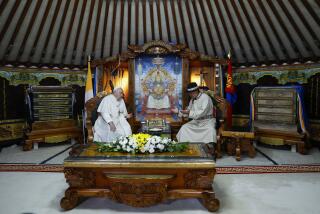Rich Countries Obligated to Aid Poor, Pope Says
- Share via
LA PAZ, Bolivia — Pope John Paul II, speaking Tuesday in South America’s poorest country, emphasized the responsibility of rich countries to help promote economic development and social justice in the Third World.
“The extreme poverty that many countries still suffer is an affront to all humanity,” he told foreign diplomats here. “The abysmal differences between rich and poor countries is incompatible with divine plans for just and equitable participation in all of creation’s assets.”
Focusing on the huge foreign debts of many developing countries, he said the interest rates demanded by lenders are out of proportion to the ability of debtors to pay and are “causing grave damage to many poor countries.”
“The Holy See can do no less than encourage all initiative aimed at resolving, according to standards of justice and equity, this grave problem, whose consequences affect above all the poorest and most dispossessed,” he said.
Observing that underdevelopment is a cause of political and social instability, he warned: “It is a fact that those factors of instability affect not only the less advanced countries, but also are the seed of other, broader conflicts that can endanger international peace.”
In another speech, at a meeting with Bolivian nuns, the Pope said poor people in Bolivia and other Latin American countries too often lack the means “to live as human persons and as children of God.”
The Pope was using his visit to Bolivia, which has a per-capita income of $573 a year, to underline what he calls the church’s “preferential option for the poor.”
“There are peasants, miners and many other workers and residents of city slums who do not earn enough to give their children the food they need,” he said.
The 67-year-old pontiff kept to a busy schedule of activities Tuesday in La Paz, which is high in the Andes, in some places almost 13,000 feet above sea level.
Tuesday morning, at an outdoor Mass attended by an estimated half-million Bolivians, the Pope climbed a long stairway to the altar with deliberate slowness.
Before arriving Monday from Uruguay, he drank three cups of coca tea aboard the Bolivian airliner that brought him here, according to a hostess on the flight. He asked for more coca tea before retiring.
The tea, often recommended to visitors for relieving the discomfort caused by high altitudes, is made from coca leaves, which are the raw material of cocaine. Legal in Bolivia, the leaves have been chewed by Andean Indians as a mild stimulant for centuries.
More to Read
Sign up for Essential California
The most important California stories and recommendations in your inbox every morning.
You may occasionally receive promotional content from the Los Angeles Times.













